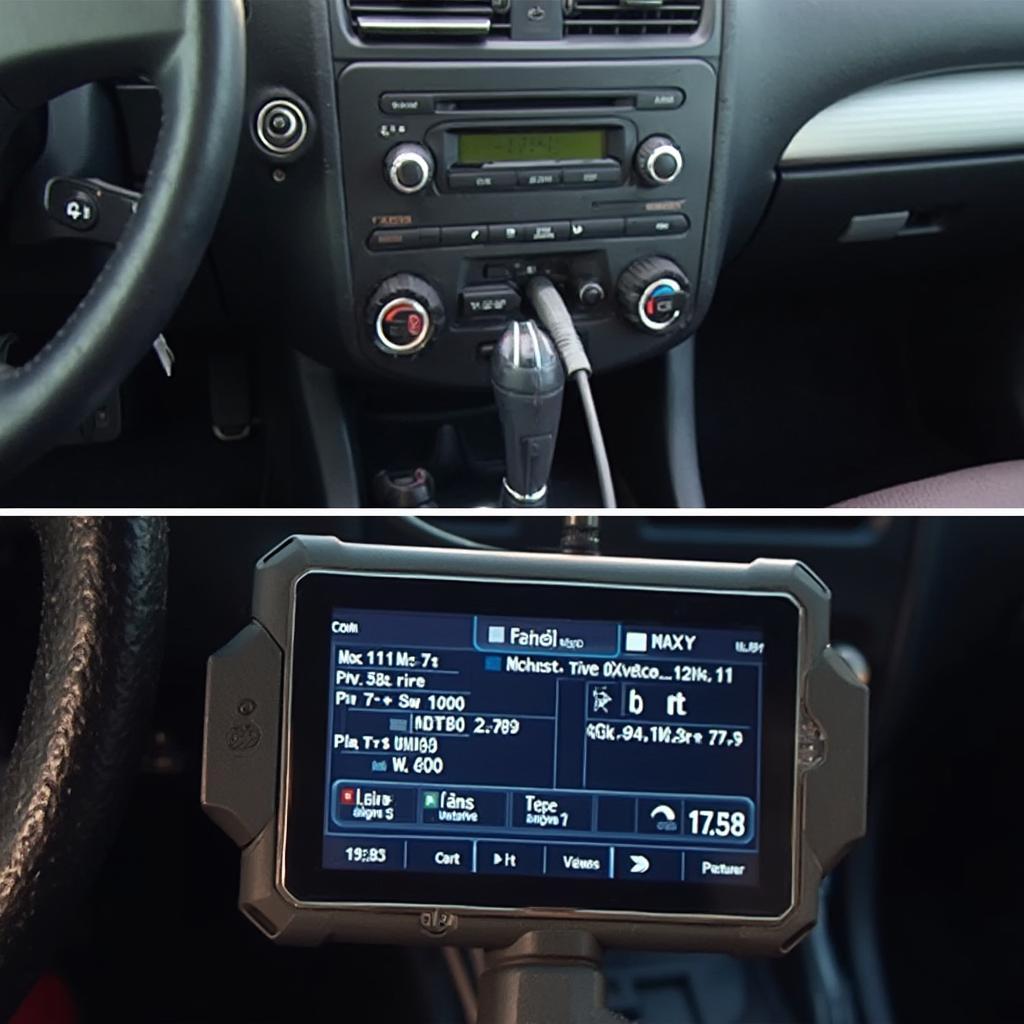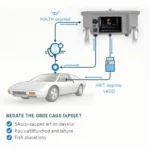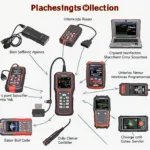OBD2 data analyzers are essential tools for anyone who wants to understand their vehicle’s performance, diagnose issues, and even improve fuel efficiency. These devices connect to your car’s OBD2 port and provide a wealth of information about the inner workings of your engine and other systems. This guide will delve into the world of OBD2 data analyzers, exploring their functionalities, benefits, and how to choose the right one for your needs.
What is an OBD2 Data Analyzer?
An OBD2 data analyzer, also known as a scan tool or code reader, is an electronic device that connects to your vehicle’s OBD2 port. This port, typically located under the dashboard on the driver’s side, allows access to the vehicle’s diagnostic data. The analyzer interprets this data and presents it in a user-friendly format, offering insights into everything from engine speed and fuel consumption to emissions and sensor readings. This information empowers car owners, mechanics, and even fleet managers to make informed decisions about maintenance, repairs, and overall vehicle management. Want to learn more about the communication protocol used by these devices? Check out our guide on the obd2 can bus protocol.
How Does an OBD2 Data Analyzer Work?
The OBD2 data analyzer acts as a bridge between your car’s computer and you. It retrieves diagnostic trouble codes (DTCs), which are standardized codes that indicate specific malfunctions within the vehicle’s systems. Beyond just displaying these codes, many advanced analyzers provide detailed descriptions of the codes, potential causes, and even suggested repair procedures. They also offer real-time data monitoring, allowing you to observe sensor readings as they change, which is crucial for diagnosing intermittent problems.
Benefits of Using an OBD2 Data Analyzer
Using an OBD2 data analyzer offers a wide array of benefits. For the average car owner, it can provide peace of mind by allowing them to understand minor issues before they escalate into major problems. For professional mechanics, an analyzer is an indispensable tool for accurate diagnostics and efficient repairs. Here’s a more detailed look at some of the key advantages:
- Early Problem Detection: Identify potential issues early on, preventing costly repairs down the road.
- Improved Fuel Efficiency: Monitor fuel consumption patterns and identify areas for improvement.
- Enhanced Vehicle Performance: Analyze engine performance data and optimize driving habits for better performance.
- DIY Diagnostics: Empower yourself to troubleshoot basic car problems and understand what’s happening under the hood.
- Cost Savings: By catching problems early, you can avoid expensive repairs and potentially even negotiate better prices with mechanics.
Choosing the Right OBD2 Data Analyzer
With so many different OBD2 data analyzers available, choosing the right one can be overwhelming. Consider your specific needs and budget. Are you a DIY enthusiast, a professional mechanic, or a fleet manager? Each user group has different requirements. Looking for a specific brand? Explore our selection of bosch obd2 readers.
Types of OBD2 Data Analyzers
- Basic Code Readers: These entry-level devices primarily read and clear DTCs. They are affordable and suitable for basic diagnostics.
- Enhanced Code Readers: These offer more advanced features, such as live data streaming and freeze frame data, providing a more in-depth look at vehicle performance.
- Professional Scan Tools: These high-end devices are designed for professional mechanics and offer comprehensive diagnostic capabilities, including bi-directional controls, advanced coding functions, and access to manufacturer-specific data.
“Choosing the right OBD2 data analyzer is crucial,” says John Smith, Senior Automotive Technician at XYZ Auto Repair. “It’s an investment that can save you money and headaches in the long run. Understanding your specific needs will help you select the tool that best fits your requirements.”
Using an OBD2 Data Analyzer
Using an OBD2 data analyzer is generally straightforward. Locate your vehicle’s OBD2 port, plug in the analyzer, and turn on the ignition. The analyzer will automatically connect to the vehicle’s computer and begin retrieving data. Most devices have intuitive menus that allow you to navigate through various functions, such as reading codes, viewing live data, and performing diagnostic tests. For specific applications, specialized tools like the bosh connect analyzer obd obd2 scanner or the obdstar bt06 car battery tester obd2 auto battery analyzer tool provide tailored functionalities.
Interpreting OBD2 Data
While retrieving data is easy, interpreting it requires some knowledge. Understanding the meaning of different DTCs and sensor readings is crucial for accurate diagnosis. Many analyzers provide built-in code libraries and help files that explain the meaning of different codes and parameters. Online resources and forums can also be helpful for understanding complex data. For those interested in deeper analysis, tools like using wireshark to sniff bluetooth obd2 offer a more technical approach.
Conclusion
An OBD2 data analyzer is a powerful tool that can provide valuable insights into your vehicle’s health and performance. Whether you’re a car enthusiast, a professional mechanic, or simply looking to save money on car repairs, an OBD2 data analyzer is a worthwhile investment. By understanding the different types of analyzers available and learning how to interpret the data they provide, you can empower yourself to take control of your vehicle’s maintenance and ensure optimal performance. Choosing the right obd2 data analyzer is the first step towards a deeper understanding of your vehicle.
FAQ
- What is the difference between an OBD2 code reader and an OBD2 data analyzer?
- Can I use any OBD2 data analyzer on any car?
- How often should I use an OBD2 data analyzer?
- What do I do if my OBD2 data analyzer doesn’t connect to my car?
- Where can I find more information about specific OBD2 trouble codes?
- Are there any free OBD2 data analyzer apps available?
- Can an OBD2 data analyzer improve my car’s fuel economy?
Need help with your OBD2 scanner? Contact us via WhatsApp: +1(641)206-8880, Email: [email protected] or visit us at 789 Elm Street, San Francisco, CA 94102, USA. We offer 24/7 customer support.


